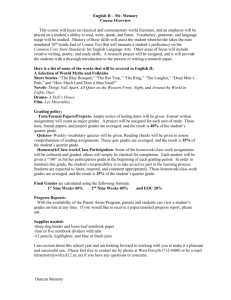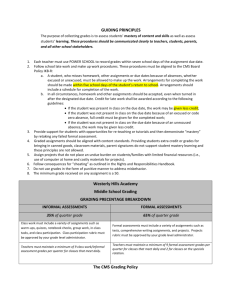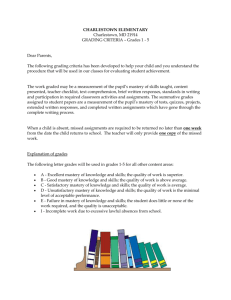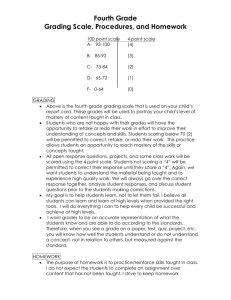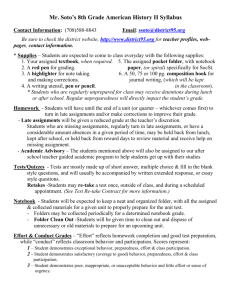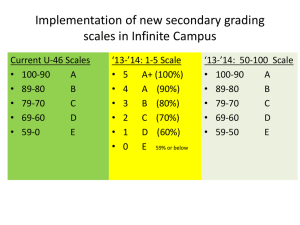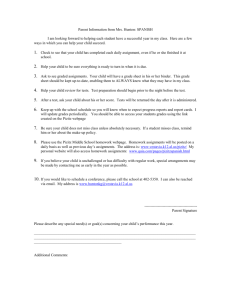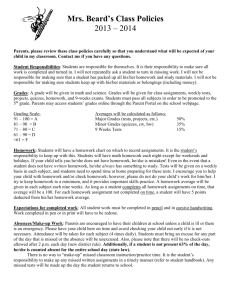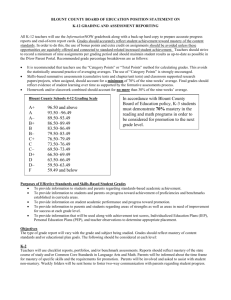Jay M. Robinson Middle School Grading Policy
advertisement
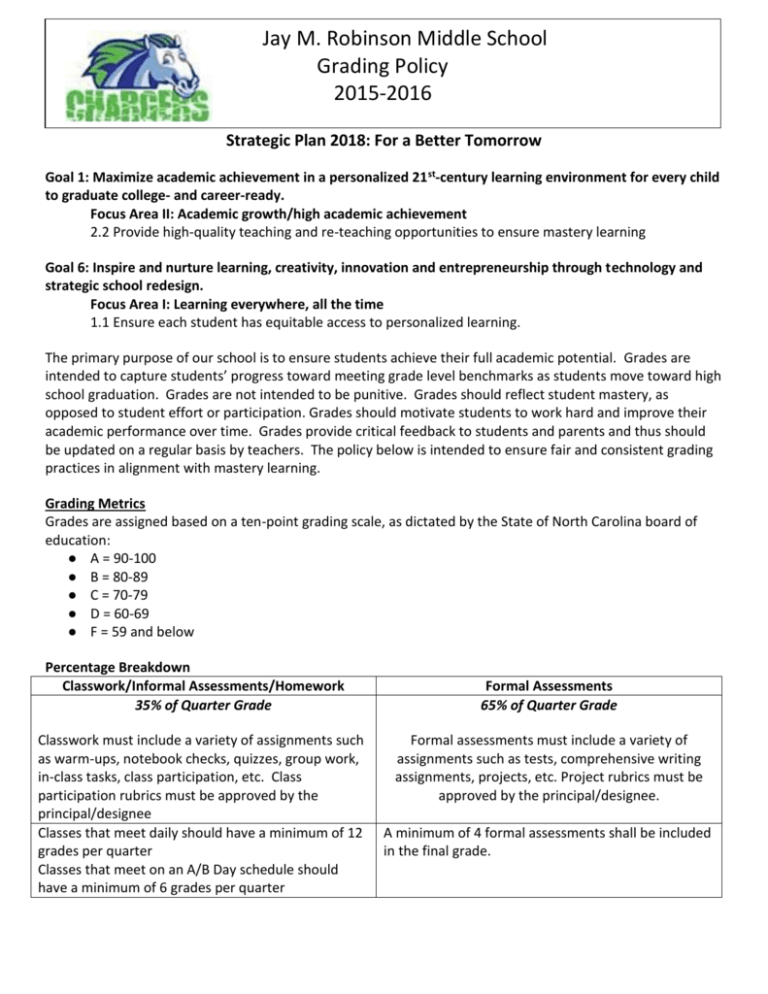
Jay M. Robinson Middle School Grading Policy 2015-2016 Strategic Plan 2018: For a Better Tomorrow Goal 1: Maximize academic achievement in a personalized 21 st-century learning environment for every child to graduate college- and career-ready. Focus Area II: Academic growth/high academic achievement 2.2 Provide high-quality teaching and re-teaching opportunities to ensure mastery learning Goal 6: Inspire and nurture learning, creativity, innovation and entrepreneurship through technology and strategic school redesign. Focus Area I: Learning everywhere, all the time 1.1 Ensure each student has equitable access to personalized learning. The primary purpose of our school is to ensure students achieve their full academic potential. Grades are intended to capture students’ progress toward meeting grade level benchmarks as students move toward high school graduation. Grades are not intended to be punitive. Grades should reflect student mastery, as opposed to student effort or participation. Grades should motivate students to work hard and improve their academic performance over time. Grades provide critical feedback to students and parents and thus should be updated on a regular basis by teachers. The policy below is intended to ensure fair and consistent grading practices in alignment with mastery learning. Grading Metrics Grades are assigned based on a ten-point grading scale, as dictated by the State of North Carolina board of education: ● A = 90-100 ● B = 80-89 ● C = 70-79 ● D = 60-69 ● F = 59 and below Percentage Breakdown Classwork/Informal Assessments/Homework 35% of Quarter Grade Classwork must include a variety of assignments such as warm-ups, notebook checks, quizzes, group work, in-class tasks, class participation, etc. Class participation rubrics must be approved by the principal/designee Classes that meet daily should have a minimum of 12 grades per quarter Classes that meet on an A/B Day schedule should have a minimum of 6 grades per quarter Formal Assessments 65% of Quarter Grade Formal assessments must include a variety of assignments such as tests, comprehensive writing assignments, projects, etc. Project rubrics must be approved by the principal/designee. A minimum of 4 formal assessments shall be included in the final grade. Effective Grading Practices ● Graded assignments should be aligned with content standards. Giving students extra credit or grades for activities such as bringing in canned goods, classroom materials, parent signatures, or participating in non-curricular activities are not acceptable grading strategies. ● Grades should not be punitive. ● Students are not to be assigned silent lunch and/or lunch detention for not turning in forms (ie. Progress reports, course prospectus, etc.). ● Teachers shall assign an initial score earned for an assignment or assessment on which the student made a concerted attempt. A zero is assigned as an initial score for an assignment for which a student did not make a concerted effort or is missing. A concerted attempt at an assignment requires a student provide an educationally relevant response to each item on the assignment in the format outlined in the assignment directions. (Follow late work policy below.) ● A class participation grade may only be assigned if there is a clear and consistent method of assessment used to provide participation grades. ● Grades for all assignments must be entered in the grade book within ten (10) school days of the assignment due date. This includes make-up work. (Note: Grades for long term assignments/projects and work turned in late are excluded from the 10 day posting requirement.) Mastery Learning ● If a student earns below a 79% on an assessment, the student may have the opportunity to make test corrections within two weeks of the original assessment administration date (or due date). The test correction grade will replace the original grade up to 79%. ● An assessment is any assignment included in the “formal assessment” section of the grade book for the course. This may include large projects or presentations, formal lab reports, and performance tasks, in addition to traditional “tests”. Homework ● Homework should reinforce content specific skills presented during classroom instruction. It should not be used to introduce new material to students, with the exception of the “flipped classroom” approach. ● Students should be encouraged to read a minimum of 30 minutes per night. Late Work ● A student who misses homework or other assignments or due dates because of absences, whether excused or unexcused, must be allowed to make up the work. ● Make-up work due to excused or unexcused absences must be completed within 10 school days for all classes. ● Students with excused absences will be able to turn in work with no penalty towards grades unless it is turned in 10 school days after their return to school date, at which point they will lose 5 points per day. ● Students who were present in class on the due date or with unexcused absences will lose 5 points per day for 10 school days. ● No make-up work will be taken for credit after the end of the quarter. ● It is the student’s responsibility to make arrangements for completing the work within five school days of the student’s return to school. ● A teacher may choose to provide extended time for a student to complete missing assignments. ● Students should be encouraged to attend tutoring with their teachers following an absence to ensure students get the academic support they need to stay current in their studies. (The Jay M. Robinson Grading Policy is based upon the Charlotte-Mecklenburg Schools Middle School Grading Procedures Plan, Strategic Plan 2018: For a Better Tomorrow and CMS Board Policies IKA, IKB-R.)
